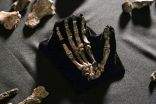Consensus statement regarding access and inclusion of geoscientists with disabilities
Released by the AGI geoscience community
2015-09-10
(Press-News.org) Alexandria, VA - The American Geosciences Institute's (AGI) is pleased to announce the release of a community consensus statement on access and inclusion of geoscientists with disabilities. This statement was inspired by the 2014 AGI Leadership Forum, which brought together the Executive Directors and Presidents of AGI's Member Societies to discuss the issue of access and inclusion of persons with disabilities in the geosciences.
The meeting was facilitated by the Executive Director of the International Association for Geoscience Diversity (IAGD) Christopher Atchison, which illuminated the challenges faced by geoscientists living with disabilities, as well as addressed strategies for increasing accessibility within the discipline.
Discussions from the event catalyzed the development of a community consensus statement illuminating the challenges and opportunities the geosciences have regarding increasing accessibility and promoting inclusion for those current and future geoscientists living with disabilities. The IAGD and AGI co-developed the statement with input from several of AGI's membership societies, resulting in a document which describes our communities' collective responsibilities and provides examples of ethical practices regarding access and inclusion of those from this underserved population.
The approved statement is posted on AGI's website, including a downloadable PDF for societies to adopt and use for their own purposes. Official signatures of supporting organizations are listed at the conclusion of the statement, representing a united front that recognizes the importance of this issue. To review the statement and find out how your organization can become involved, please go to: http://www.americangeosciences.org/community/disability-consensus-statement and contact Heather Houlton at hrh@americangeosciences.org for more details.
INFORMATION:
The American Geosciences Institute is a nonprofit federation of geoscientific and professional associations that represents more than 250,000 geologists, geophysicists and other earth scientists. Founded in 1948, AGI provides information services to geoscientists, serves as a voice of shared interests in the profession, plays a major role in strengthening geoscience education, and strives to increase public awareness of the vital role the geosciences play in society's use of resources, resiliency to natural hazards, and interaction with the environment.
ELSE PRESS RELEASES FROM THIS DATE:
2015-09-10
NASA's RapidScat instrument analyzed the sustained surface winds of Tropical Storm Henri on Sept. 8 as the storm was intensifying.
When the International Space Station flew over Tropical Depression 8 in the Eastern Atlantic Ocean on September 8 at 1p.m. EDT, NASA's RapidScat instrument aboard captured data on the storm's surface winds. RapidScat showed that there were tropical-storm-force winds north and east of the center near 27 meters per second (60.4 mph/97.2 kph). However, sustained winds on the west and southwestern quadrants were near 12 meters per second (26.8 ...
2015-09-10
September 10, 2015 (Washington) - There are substantial differences among Americans when it comes to knowledge and understanding of science topics, especially by educational levels as well as by gender, age, race and ethnicity, according to a new Pew Research Center report.
The representative survey of more than 3,200 U.S. adults finds that, on the 12 multiple-choice questions asked, Americans gave more correct than incorrect answers. The median was eight correct answers out of 12 (mean 7.9). Some 27% answered eight or nine questions correctly, while another 26% answered ...
2015-09-10
DOWNERS GROVE, Ill.-- September 10, 2015--Having patients lie on their left side while the right side of their colon is being examined can result in more polyps being found, thus increasing the effectiveness of colonoscopy for colorectal cancer (CRC) screening, according to a study in the September issue of GIE: Gastrointestinal Endoscopy, the monthly peer-reviewed scientific journal of the American Society for Gastrointestinal Endoscopy (ASGE).
CRC is one of the most common cancers in the US and other western countries. Studies have shown that deaths from CRC are reduced ...
2015-09-10
Two recently published studies in the journals Age and the British Journal of Nutrition (BJN) demonstrate that consuming cocoa flavanols improves cardiovascular function and lessens the burden on the heart that comes with the ageing and stiffening of arteries. The studies also provide novel data to indicate that intake of cocoa flavanols reduces the risk of developing cardiovascular disease (CVD).
As we age, our blood vessels become less flexible and less able to expand to let blood flow and circulate normally, and the risk of hypertension also increases. Arterial stiffness ...
2015-09-10
This news release is available in German. Protein labeling with synthetic fluorescent probes is a key technology in chemical biology and biomedical research. The target proximity achieved by small-molecule probes is essential to exploit the full potential of super-resolution fluorescence microscopy. Single-molecule localization techniques provide high spatial resolution by reporting on the position of the fluorophore and thus only indirectly on the target molecule itself. Large labels, such as antibodies, can misleadingly position a fluorophore tens of nanometers away ...
2015-09-10
An international research team, which includes NYU anthropologists Scott Williams and Myra Laird, has discovered a new species of a human relative. Homo naledi, uncovered in a cave outside of Johannesburg, South Africa, sheds light on the diversity of our genus and possibly its origin.
"This discovery is unprecedented in the sheer number of hominins collected from such a small area in the virtual absence of other animal remains," says Williams, an assistant professor in NYU's Department of Anthropology. "That makes this site unique. Moreover, the announcement describes ...
2015-09-10
Bethesda, MD (Sept. 10, 2015) -- Detection of small fragments of tumor DNA, known as circulating tumor DNA, in a patient's pre-surgery serum samples predicts early recurrence of hepatocellular carcinoma and may guide treatment, according to a study1 published in Cellular and Molecular Gastroenterology and Hepatology, the basic and translational science journal of the American Gastroenterological Association. Hepatocellular carcinoma -- the most common type of liver cancer -- is the third leading cause of cancer deaths worldwide.
"We uncovered that circulating tumor DNA ...
2015-09-10
The steps involved in evaluating and diagnosing patients with epilepsy are complicated. In a new and extensive literature review of available information, experts provide insights on the valuable role of genetic testing in the diagnosis and care of pediatric epilepsy.
Epilepsy is a common neurological disorder that affects up to 1.5% of the world's population and is more commonly diagnosed in children than adults. Most cases of epilepsy have been considered "idiopathic" or of unknown cause, but recent advances in genetic testing are providing insights on the potential ...
2015-09-10
In a modern, multicore chip, every core -- or processor -- has its own small memory cache, where it stores frequently used data. But the chip also has a larger, shared cache, which all the cores can access.
If one core tries to update data in the shared cache, other cores working on the same data need to know. So the shared cache keeps a directory of which cores have copies of which data.
That directory takes up a significant chunk of memory: In a 64-core chip, it might be 12 percent of the shared cache. And that percentage will only increase with the core count. Envisioned ...
2015-09-10
MADISON, Wis. -- Working in a cave complex deep beneath South Africa's Malmani dolomites, an international team of scientists has brought to light an unprecedented trove of hominin fossils -- more than 1,500 well-preserved bones and teeth -- representing the largest, most complete set of such remains found to date in Africa.
The discovery of the fossils, cached in a barely accessible chamber in a subterranean labyrinth not far from Johannesburg, adds a new branch to the human family tree, a creature dubbed Homo naledi.
The remains, scientists believe, could only have ...
LAST 30 PRESS RELEASES:
[Press-News.org] Consensus statement regarding access and inclusion of geoscientists with disabilities
Released by the AGI geoscience community


